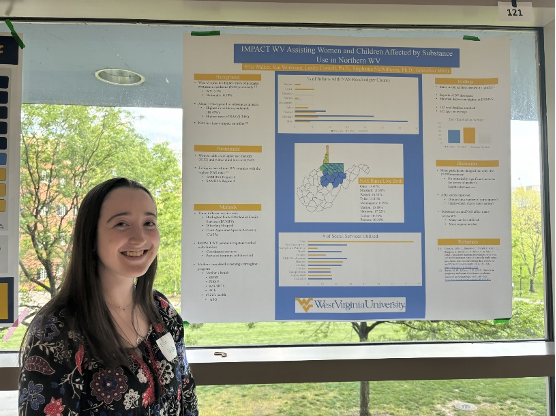Researching neonatal abstinence syndrome using a two-generational approach

Ellis Walker, an undergraduate student at WVU pursuing a bachelor's degree in psychology, worked with the IMPACT WV team to analyze data from the three demonstration sites to summarize findings from the first round of research initiatives.
West Virginia is the second most rural state in the nation and the only one completely within the Appalachian region. The state’s youngest population (0 to 8 years) is presently vulnerable to opioid use and neonatal abstinence syndrome (NAS). This epidemic is associated with poor health outcomes, chronic stress from abuse and neglect, and poverty. West Virginia continues to see a rise in opioid use and addictions, including in pregnant women.
For the last five years, the IMPACT WV program at the West Virginia University Center for Excellence in Disabilities (WVU CED) has tested and implemented models of care to strengthen services for West Virginia families with infants born exposed to substances in utero or diagnosed with NAS. The proposed activities of IMPACT WV are being implemented in nine northern counties in West Virginia that had the greatest incidence of NAS among infants. The program is examining this impact and developing best practices through the demonstration project. This information considers whether coordination efforts, communication and other connections with partners, and a focus on two-generations (including kinship care) successfully impact families in the rural setting in the short-term (within 6 months of enrollment), intermediate-term (6-12 months from enrollment), and long-term (more than 1 year from enrollment).
The IMPACT WV team found that the most effective model of care for infants happens when patient navigation begins in the birthing hospital. Patient navigators play important roles supporting the family by providing services to the child and those who promote the child’s development. These findings influenced the second round of program testing to refine service needs and family outcomes. IMPACT WV is now providing patient navigation services along with an interdisciplinary team of providers from the WVU Medicine Children’s Neonatal Abstinence Syndrome (NAS) Follow-Up Clinic. The patient navigators are enrolling participants in the second round of research that is coordinating care for multi-generational families, providing direct aid and addressing needs that include housing, utilities, transportation, food, domestic violence services, dental, basic needs, family planning, insurance coverage, treatment, recovery support, family reunification, employment and NAS follow-up care. Findings from this research will inform strategies to develop and expand services.
